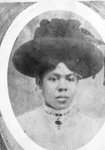


During Black History Month, the News + Record is featuring discussions about issues related to the African American experience in our Chatham Chats. This week, we speak with historian Antonio Austin, an 8th-generation native of Pittsboro, about his research into his family’s local heritage.
Austin graduated from Northwood High School in 2010, then obtained his Bachelor’s degree in Human Service Studies, minoring in African/African-American Studies at Elon University. He then obtained his Master of Education in Educational Leadership in 2017 at Valdosta State University in Georgia. During his matriculation and post-graduation, he worked in higher education, advising fraternities and sororities in Georgia, Indiana and North Carolina.
Today, he’s a first-year Ph.D. student in the Department of History at Howard University in Washington, D.C. His career goal after graduation is to work in the museum or archival setting preserving the histories of Black people within the United States whose stories have been silenced or written out of the historical narrative.
You’re studying history at Howard University and you’ve been sharing lots of your family’s history during Black History Month. Why is history so vitally important to us?
History gives us an interesting perspective. I truly believe in the old saying that “if you don’t know your history, then you’re bound to repeat it.”
People often see history as being about these famous people who did profoundly great (or horrible) things and are often put on a pedestal. However, I believe that we are more open to history when we are able to humanize these individuals and realize that they had feelings just like everyone else, and made mistakes in their lives as well. History also convicts us regarding the wrongs that we have done and how we can collectively be better humans to our neighbors and those who come after us. It ultimately is a way of giving ourselves a chance to be better and do better.
Your family traces its history in Chatham County to at least the mid-1800s. As you’ve researched, how would you characterize your family’s attachment to Chatham and what the land and people here have meant to your family?
It’s so astonishing to say, but my family has been here for at least 200 years — and that is on several lines!
I think that my family has always seen Chatham County — mainly Pittsboro — as home regardless of the circumstances. This is the place where many of us grew up along with the generations before us. I believe that the sense of community, especially with our neighbors, has kept people wanting to still be here. I think that the physical land also means so much to us because of the individuals who worked tirelessly to purchase land — especially those who were formerly enslaved.
To go from being seen as property to acquiring things that society previously said were not meant for you is amazing. I think that that type of connection to the people and the land are truly what have kept us in Chatham for so long. I also believe that many of my family members have tried to make things better for the next generation, in hopes that they will reach successes that they only dreamed of.
You’ve shared and told many of your family’s stories and its history on Facebook this month. Can you share some with us?
There are a couple of people that I heard about growing up, such as Thomas Taylor and Renty Sanders, who were both ancestors on my father’s side. Thomas Taylor was born around 1807 and enslaved here in Pittsboro. He was a stonemason which I believe allowed for him to rent himself out and earn money. He was able to purchase land in December 1865, only a short few months after being emancipated, then was able to purchase land yet again on New Years’ Day 1867.
Renty Sanders was an ancestor that I had always heard of through his experience as a Civil War veteran. I had tried for years to confirm this fact, then came across his obituary in the newspaper from 1918. In that article, it noted: “Renty Sanders, a worthy colored man … He went through the civil war — 1861-’65 — with his master and was a faithful and reliable servant…” This was such a joy to find! I hope that one day I will be able to potentially find more about his experience within the Civil War.
On my mother’s side, I had been told that my great-grandmother’s sister, Mattie Craig Penn, worked for John F. Kennedy. After researching this, I found out that Aunt Mattie indeed worked for the Kennedys prior to his presidency and had such an affectionate relationship with them. I was able to find that their book, Camelot at Dawn, actually dedicated a chapter to my aunt and included a couple of pictures with her and Jackie Kennedy.
I have always loved to hear my grandpa speak of his grandfather (Robert) Dude Farrar. Anytime he speaks about him, you can see the joy in his eyes as he recounts hearing his grandfather singing “The Diamond Road” as he walked past his parents’ house.
Those types of tidbits always brought joy and pride to those who were telling me. These types of stories passed down are one of the reasons why I have always loved history and been curious about those who came before me.
You’ve been able to find many family members who were slaves during the 1800s. What changed — and what didn’t change — after Emancipation for your family, particularly those in Chatham County?
One of the things that obviously changed was their freedom — they were able to have autonomy over themselves; however, that was often challenged through the use of Black codes then with the emergence of the Ku Klux Klan, along with segregation. I believe that I have family members who were able to navigate this well as they were blessed with more opportunities than other sides in my family. With Emancipation, several of my ancestors officially married their spouses, along with being able to have the choice of whom to marry. They were able to acquire property and leave that for their descendants, to worship freely, and to learn to read and write.
Some of the things that did not change were the types of discrimination that they had to face — lasting up until the time my parents were pre-teen/teenagers. Unfortunately, some of them were stuck in a cycle of poverty because they did not have the necessary resources to thrive after only a generation or two removed from enslavement.
However, throughout all of the bad, they tended to at least have the support of their family and their community which can still be seen in so many branches of my family to this day!
For those interested in history, how are you performing the research? What can you share with others who are interested in looking back?
One of the things that have been key for my research is oral history, which allowed me to become familiar with some of my ancestors. However, it is also important to utilize primary and secondary documents to support the oral tradition (starting from yourself and going backward). There are so many resources and collections that have been digitized, however; there’s nothing like utilizing local records through the Register of Deeds, the Clerk of Court, the Chatham County Historical Society, and the library. A great network that I love is BlackProGen, which is a collective of genealogists who specialize in researching people of color. They offer free videos online on an array of topics.
What’s been the response to what you’ve shared?
I have been extremely surprised by the number of individuals who are really receptive to my posts. There have been so many people who have liked and shared the posts over the years, which makes me happy that people find the things that I am sharing, interesting! My goal is always to make this information public, transparent and informative. After initially doing these posts in February 2018, it led me to create my blog, Young Black Genie.
Historians also like to look ahead. What do you foresee for Chatham County in its future?
I foresee Chatham County to continue growing! What I do hope for the county is that the rich history — whether good or bad — is taught and we are able to grow from it. I hope that those individuals who have been pivotal to the success of many people within the community are never forgotten, and the torch that they have carried is never dropped!